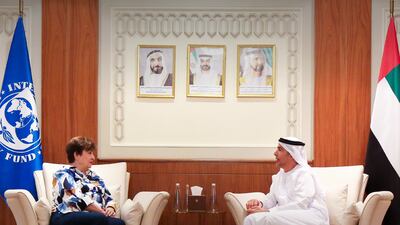The UAE Central Bank and the International Monetary Fund met in Abu Dhabi to discuss relations, including joint co-operation on sustainable financing ahead of the Cop28 climate summit hosted by the Emirates in November.
The banking regulator's ambitious agenda for green financing, aligned with the UAE's strategy for sustainable economic growth and financial stability, was also a key topic of discussion, the Central Bank said on Wednesday.
“We welcome all efforts to strengthen our co-operation and relations with international financial institutions, particularly the International Monetary Fund," Central Bank governor Khaled Balama said.
"The UAE acknowledges the role these ties play in supporting our efforts to establish sustainable growth in various sectors and in enhancing the UAE’s position in the global stage and its contribution to providing effective solutions that ensure financial stability, drive global economic growth and encourage sustainable development.”
Earlier on Wednesday, Abu Dhabi clean energy company Masdar said it raised $750 million through the sale of 10-year senior unsecured notes that will help it fund renewable energy projects.
The green bond was 5.6 times oversubscribed, with the order book peaking at $4.2 billion, Masdar said.
Ahead of the UAE hosting the UN climate change conference, the country is seeking to prioritise initiatives that advance climate finance and decarbonisation.
The Central Bank and the IMF representatives also discussed efforts to enhance the integrity of the financial system and support global economic growth, the statement added.
The two entities also addressed the current and projected state of the regional and global economy amid growing geopolitical tensions, which have led to a slowdown in growth, higher inflation and bigger risks to trade and capital flows.
The banking sector in the UAE is well capitalised with adequate liquidity buffers and remained resilient last year against the risk of stagflation and market uncertainty, the Central Bank said last week.
Banks also benefitted from the UAE’s robust economic momentum last year, as aggregate credit growth rebounded and profitability jumped, the banking regulator said in its Financial Stability Report 2022.
Other topics discussed during the meeting included sustainable development indicators, economic growth and developments in the UAE's financial system as the country is expected to maintain "healthy levels" of gross domestic product growth, despite global challenges, the Central Bank said.
"This growth is attributed to growth in non-oil GDP and the UAE's commitment to diversification, knowledge, innovation and digitisation, which has contributed to the distinguished resilience and stability of the country’s financial system," the regulator said.
The UAE Central Bank in June revised its forecast for the country's non-oil economic growth for 2023 to 4.5 per cent, from 4.2 per cent in March, amid a surge in its travel and tourism industry, while inflation is projected to slow marginally.
After expanding by 7.2 per cent last year, the non-oil sector is estimated to have grown at a slightly lower pace in the first quarter of this year, the Central Bank said in its Quarterly Economic Review.

